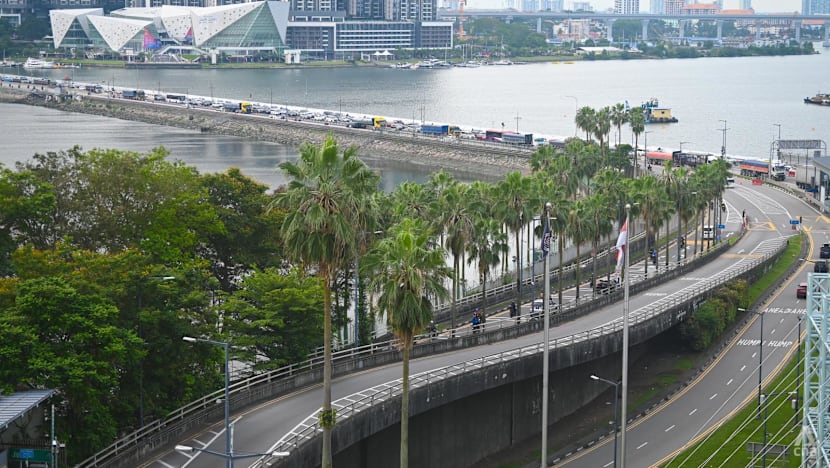Singapore and Malaysia in talks to let cross-border taxis drop off passengers at final destination
For the convenience of commuters, more pick-up points will also be identified in both Johor Bahru and Singapore, said Senior Minister of State for Transport Sun Xueling.

The roads leading to the causeway from Woodlands Checkpoint. (File photo: CNA/Syamil Sapari)

This audio is generated by an AI tool.
SINGAPORE: Bilateral talks are being held to allow eligible Malaysian cross-border taxis to drop off passengers anywhere in Singapore rather than at designated drop-off points and for eligible Singaporean taxis to do likewise in Johor Bahru, said Senior Minister of State for Transport Sun Xueling on Wednesday (Oct 15).
“We recognise that there is demand from commuters for more convenient cross-border point-to-point (P2P) services,” Ms Sun said in parliament.
“This will provide greater convenience to commuters from both countries.”
Ms Sun was responding to questions about whether the Ministry of Transport (MOT) is looking into facilitating more point-to-point (P2P) transfers between Singapore and Johor Bahru given the setting up of Johor-Singapore Economic Zone.
Cross-border taxis are currently permitted to pick up and drop off passengers only at a single designated point respectively - Larkin Sentral in Johor Bahru for Singapore taxis and Ban San Street Terminal in Singapore for Malaysian taxis.
Singapore- and Malaysia-registered taxis are the only licensed providers of cross-border services approved by Singapore’s Land Transport Authority (LTA) and Malaysia’s Land Public Transport Agency.
Each country is given a quota of 200 taxis for such services. There are about 300 licensed cross-border taxi drivers across Singapore and Malaysia in total, LTA said in July.
Ms Sun said that for pick ups, foreign taxis would be allowed to pick up passengers only at designated points so that they do not infringe into the local P2P market. This is to minimise foreign taxis cruising around empty and potentially carrying out illegal trips.
However, for the convenience of commuters, more pick-up points will be identified in both Johor Bahru and Singapore, said Ms Sun.
“We will discuss options with the Malaysian authorities on a reciprocal basis.”
Ms Sun said the authorities will continue to engage the National Taxi Association (NTA) and the National Private Hire Vehicles Association (NPHVA) to take in their suggestions.
She said that the use of location tracking, including ERP 2.0, and other measures to prevent illegal trips by cross-border taxis within Singapore, are also being explored.
In September, LTA said that over 100 foreign-registered vehicles have been investigated this year for suspected involvement in illegal cross-border passenger transport services, with most remaining impounded as investigations and court proceedings continue.
Some of these vehicles may be registered to Malaysian tour companies, LTA had said.
Ms Sun said on Wednesday that since July this year, the LTA has impounded 107 vehicles whose drivers were caught providing illegal services.
Those found providing illegal ride-hailing services face up to S$3,000 (US$2,327) in fines, six months’ jail or both. Their vehicles may also be forfeited.
Repeat offenders face stiffer penalties, with their vehicles liable to forfeiture.
“LTA will continue its enforcement efforts even after enhancements to the existing arrangements are being rolled out,” said Ms Sun.
DISCUSSIONS TO ROLL OUT CROSS-BORDER SCHEME TO MORE TAXIS, CLAMPDOWN ON UNAUTHORISED APPS
Mr Ang Wei Neng (PAP-West Coast-Jurong West) asked if there is a plan to extend the fleet quota of 200 cross-border taxis.
Ms Sun said that the discussion points between Singapore's Ministry of Transport and Malaysia's Ministry of Transport include a higher quota of taxis for each country, the introduction of larger multi-purpose vehicle taxi models and the use of ride-hailing applications to make bookings.
Mr Ang, who is also the chief executive officer of taxi operator Strides Premier, asked if there are plans to expand this cross-border transport service to private-hire cars.
Ms Sun said that the involvement of private-hire vehicles should be “approached cautiously” based on discussions with the NPHVA.
“They are conscious that if we should liberalise the cross-border taxi scheme too widely and not have a separate scheme for private-hire vehicles, there could be a situation where (private-hire vehicles) could end up providing illegal point-to-point services in Singapore,” she said.
She added that any vehicle that operates in Singapore, especially those which are foreign, needs to have the necessary decals and livery so that it is “very clear that they are part of a licensed scheme”.
Associate Professor Jamus Lim (WP-Sengkang) asked if MOT is planning to crack down on the proliferation of illegal cross-border services hired through chat groups.
Ms Sun said that MOT and LTA is looking to obtain “further legal powers” to ensure that online platforms comply with the LTA’s removal request for illegal P2P services should the platforms remain unresponsive.
“At the same time, the LTA has also been conducting operations to infiltrate into these chat groups and to take action against providers of such illegal services,” she added.
















